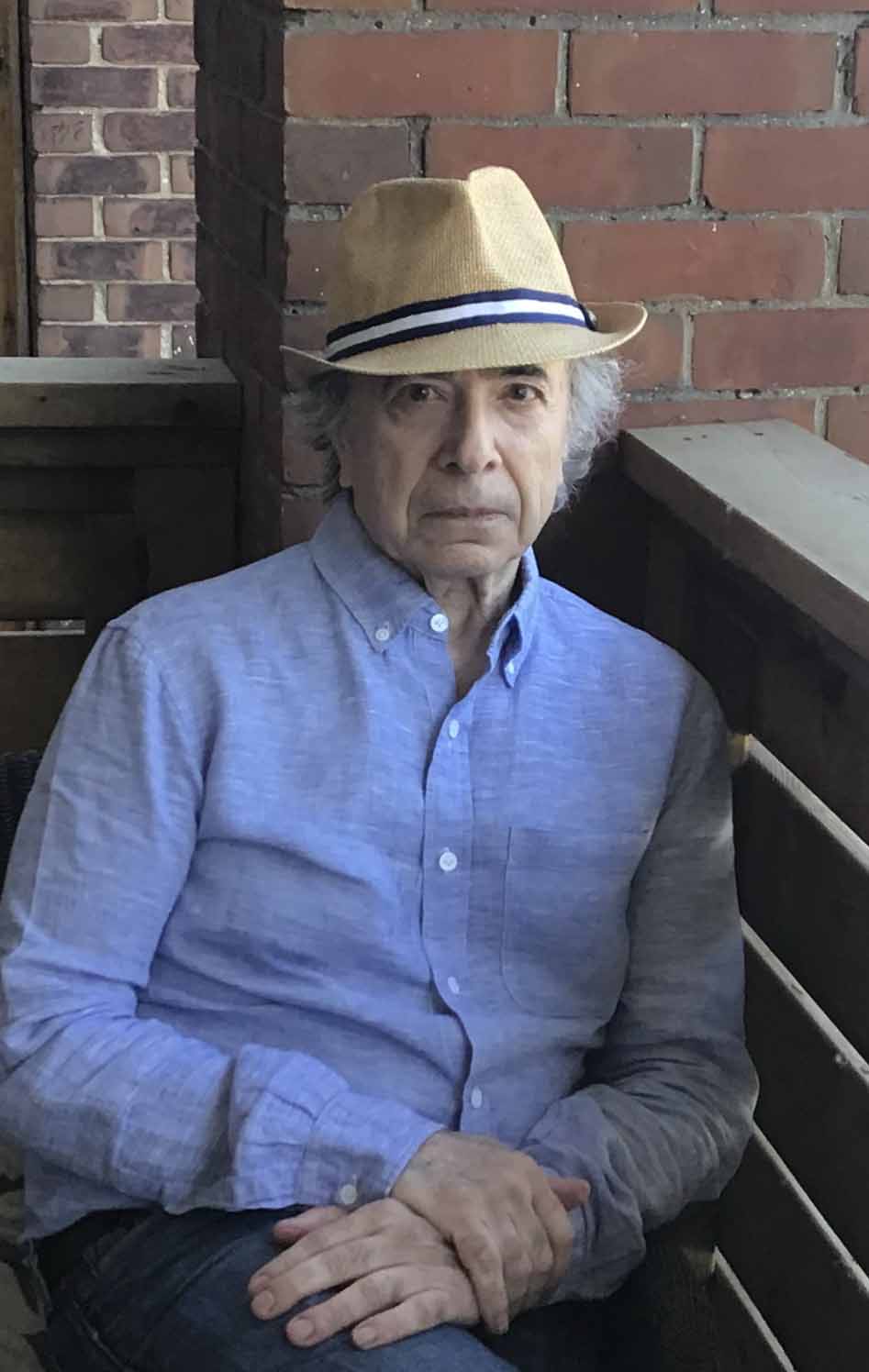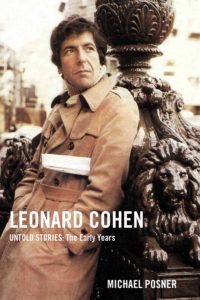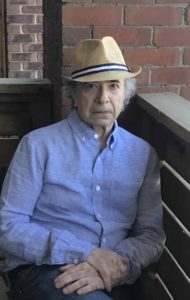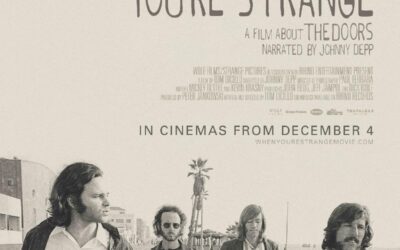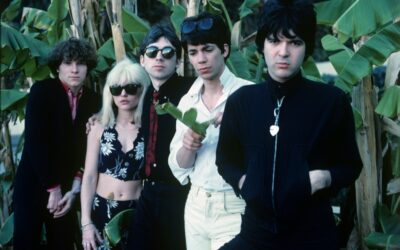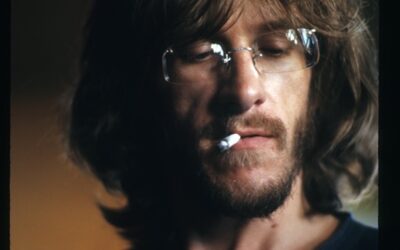To be published by Simon & Schuster in Canada during October
Collector’s Edition Montreal Leonard Cohen Memorial Commemorative Box Set Out
By Harvey Kubernik
Poet, novelist, singer-songwriter, artist, prophet, icon—there has never been a figure like Leonard Cohen. He was a true giant in contemporary western culture, entertaining and inspiring people everywhere with his
work.
From his groundbreaking and bestselling novels, The Favourite Game and Beautiful Losers, to timeless songs such as “Suzanne,” “Dance Me to the End of Love,” and “Hallelujah,” Cohen is a cherished artist.
His death in 2016 was felt around the world by the many fans and followers who would miss his warmth, humour, intellect, and piercing insights.
I was an acquaintance of Leonard Cohen for over 45 years.
In the mid and late seventies I conducted a series of interviews with Leonard for Melody Maker at his two different Southern California residences, was present on many of his Phil Spector-produced recording sessions at Gold Star and MCA/Whitney, handclapped on a couple songs, visited him during engineer/producer Henry Lewy sessions, mixes and playbacks at Kitchen Sync Studios, and noshed with Cohen at local haunts a handful of times during this century.
In 2015 I wrote and assembled a hardcover coffee table size volume Leonard Cohen: Everybody Knows for Palazzo Editions currently published in six foreign languages. In 2016, the title was also published in Chinese and Russian.
If you’re interested in reading about my documentation and encounters with Leonard Cohen visit these well-respected Cohen-driven websites.
The Leonard Cohen Files
Our Leonard Cohen Forum at www.leonardcohenforum.com is the meeting … Multi-voice narrative memoir tribute to LC – by Harvey Kubernik (pdf) (Sept 23)
Leonard Cohen: Everybody Knows by Harvey Kubernik
In the March 1, 1975 issue of Melody Maker, the now defunct English music weekly, I discussed touring, music and his literary influences with Leonard one afternoon at the Continental Hyatt House in Hollywood, which followed his Troubadour Club engagement.
“I used to be petrified with the idea of going on the road and presenting my work,” he told me in our first interview. “I often felt that the risks of humiliation were too wide. But with the help of my last producer, Bob Johnston, I gained the self-confidence I felt was necessary. My music now is much more highly refined.
“When you are again in touch with yourself and you feel a certain sense of health, you feel somehow that the prison bars are lifted, and you start hearing new possibilities in your work.
“I don’t have any reservations about anything I do. I always played music. When I was 17, I was in a country music group called the Buckskin Boys. Writing came later, after music. I put my guitar away for a few years, but I always made up songs. I never wanted my work to get too far away from music,” stressed Cohen.
“In the early days I was trained as a poet by reading English poets like Lorca and Brecht, and by the invigorating exchange between other writers in Montreal at the time.
“My tunes often deal with a moral crisis. I often feel myself a part of such a crisis and try to relate it in song. As far as the use of Biblical characters in such tunes as ‘Story Of Isaac’, and ‘Joan Of Arc’, it was not a matter of choice. These are the books that were placed in my hand when I was developing my literary tastes.”
A native of Montreal, Leonard Cohen enjoyed Los Angeles. “I like it,” he told me in a 1978 interview portions were published in Phonograph Record Magazine. “It’s so desperate here that it’s really not bad at all. And, besides, this is the only city in the world where I’ve ever written a song while sitting in a driveway in a parked car.”
I’m very excited about the October 2020 publication from Simon & Schuster in Canada of Leonard Cohen, Untold Stories by bestselling author and biographer Michael Posner which chronicles the full breadth of his extraordinary life. (Volume 2 is now out: Leonard Cohen, Untold Stories: From This Broken Hill)
The first of three volumes—The Early Years—follows him from his boyhood in Montreal to university, and his burgeoning literary career to the world of music, culminating with his first international tour in 1970.
Through the voices of those who knew him best—family and friends, colleagues and contemporaries, rivals, business partners, and his many lovers—the book probes deeply into both Cohen’s public and private life.
It also paints a portrait of an era, the social, cultural, and political revolutions that shook the 1960s.
In this revealing and entertaining first volume, Michael Posner draws on hundreds of interviews to reach beyond the Cohen of myth and reveal the unique, complex, and compelling figure of the real man.
Posner is an award-winning Toronto writer, playwright, and journalist, and the author of seven books. These include biographies of novelist Mordecai Richler (The Last Honest Man, 2004), selected as one of the Globe and Mail’s top 100 books of that year); singer Anne Murray (All of Me, 2010, as ghostwriter); as well as books on medicine, film, public opinion, and money.
He was Washington Bureau Chief for Maclean’s Magazine, and later served as its National, Foreign, and Assistant Managing Editor. He was managing editor of the Financial Times of Canada for three years.
Posner later spent sixteen years as a senior writer with the Globe and Mail, Canada’s national newspaper. Two of his critically acclaimed plays were mounted at the Toronto Fringe Festival.
He began work on Leonard Cohen, Untold Stories in December 2016.
Michael Posner first saw Leonard Cohen read in January 1967 in Winnipeg, Canada at the University of Manitoba and later witnessed his 2013 Toronto concert.
Posner has done his homework. I was honored when Michael and his editor at Simon & Schuster asked me and several other notable authors and poets to pen testimonial praise for the book back jacket.
“Posner is our Cohen-centric tour guide. He has delivered an enthralling oral history, carefully weaving the multi-voice narratives to us in a revealing, deep-dive exploration. I eagerly await the next volume.”
— HARVEY KUBERNIK, music historian and author of Leonard Cohen: Everybody Knows
“With this book, Michael Posner has pushed the horizons of biographical possibility. The voices gathered here are indispensable to complete the splendid mosaic that is Leonard Cohen.”
“Through these stories, a unique portrait of a young Leonard Cohen is revealed, with insights into not only his extraordinary life but also his timeless poetry and music.”
— ANNE MURRAY, Grammy Award–winning singer
“Posner masterfully weaves an abundance of interviews with Cohen’s family, friends, and myriad lovers to create an intricate tapestry and, ultimately, produces the most revealing portrait of the legendary songwriter and wordsmith to date.”
— NICHOLAS JENNINGS, journalist and bestselling author of Lightfoot
“Out of a welter of stories—from those who encountered Leonard Cohen as associate, friend, or lover—Michael Posner has shaped a fascinating multi-faceted portrait. Posner is indeed Cohen’s Boswell, no doubt about it.”
— SEYMOUR MAYNE, poet, editor, and translator
In August 2020 I conducted an email interview with Michael Posner.
Q: What is the genesis of your Leonard Cohen book?
A: The genesis was actually the Mordecai Richler book. It had done pretty well critically, but not commercially. It struck me that Cohen was a much bigger name and was a book that could sell internationally. When I wrote him, about 2007, the only biography of any consequence was Ira Nadel’s Various Positions…but as you know, nothing happened then. He said no. I dropped the idea.
When he passed, Sylvie Simmons’ book was out—for four years— but I knew as a journalist that there had to other stories around. She had followed and fleshed out the familiar story line very well, but I knew there had to be hundreds of people who had stories or something new to say about him that had never been spoken to. The trick would be finding and persuading them to talk — hard, but less hard because he had passed
Q: What always drew you to Leonard’s work? Your previous books are in other arenas.
A: I loved the music and the early poetry… but truthfully, I think my ambitions were journalistic. This was a guy of masks. He was very careful and skillful about his public presentation…Could some of those masks be stripped away? And what would be revealed? And would what might be revealed be connected to his work? So yes a fan, but that wasn’t the key. At the beginning it was just instinct—there had to be more. Had to be. But almost as soon as I started, I realized there was a, infinitely more and b, I had taken on a huge challenge, not only because I was seeking new voices on Cohen, but because I also had to cover the known narrative as well — it is after all a biography. So I’d need to find, if I could, new wrinkles even in the old stories. Sometimes I did, sometimes I didn’t. But with virtually every interview, I was coming away with new material. Not always home runs, usually singles, even bunts…but as it accumulated, I was confident that Cohen fans particularly, who can be obsessive, would want these stories—if I could find a publisher.
Q: And you embarked on this literary journey without a book deal, even schlepping to Los Angeles and other destinations.
A: Yes… Los Angeles, New York City, Hydra in Greece, Austin, Texas, London, England, Ithaca, New York a few times, San Francisco and Montreal several times.
Q: I happily turned over some leads to you that I didn’t utilize in my own Cohen book. I’m a record geek more interested in sound engineers, producers, studios and musicians and not the women, sex trips and drugs in my books. However, I am curious if the Israeli woman I recommended from the bagel shop in the San Fernando Valley in California was for real?
A: Yes. Totally legit, but there’s a more interesting one in the second book.
Q: How did this book deal happen? Did you solicit a manuscript? A literary agent? I’m sure there were nibbles but there seemed to be a sense of destiny for the endeavor, let alone a multiple book deal for three volumes.
A: My initial proposal was initially rejected but then they changed their minds. And though they first said the full manuscript—then 600,000 words— would have to be cut dramatically, they changed their mind again and said let’s do three separate books so the cutting was minimized. I was hugely fortunate
Q: Even before doing additional research, further writing and editing the first book, tell me about some of your feelings and appreciation of Cohen’s work before you really got going in the journey.
A: To be honest, I was not a student of his work before I began. I liked much of it, even most, but just as a fan, not any in-depth analysis… I did think that the first novel was largely autobiography, and that many of the songs were also, as he said of the song “Suzanne,” essentially reportage… the trick would be to decipher who is who in the lyrics… Because like most writers, he wrote what he knew…The three books, then just a single volume, were largely done when I got the contract. I did develop a deeper appreciation for his work, his craftsmanship…his dedication, his genius…his ability to deploy the very specific to address the universal…the contemporary to reach the eternal.., and with humour…I do think many of the songs will last a very long time
Q: During the writing process, once the deal happened, and as you turned in volume 1, what changed or was really obvious now to you about Cohen as person and artist as a biographer?
A: Well, part of the answer is my appreciation for his gifts and his commitment to those gifts. On the human side, I saw a guy who really struggled…struggled with the consequences of fame on his life and art, struggled to keep pushing himself not to repeat himself… struggled, that is, to move the creative goalposts on himself… struggled hugely with relationships…his ‘marriage,’ his children, his many lovers. None of this was easy…add to that his bipolar condition, which led to severe down periods…and you begin to see how complicated a life he led… he had trouble staying in one place…emotionally and physically… as soon as a sense of comfort or complacency or predictability was manifest, he checked out… and yet, for good friends, he was always there with time or money… and 95 per cent of the women he met, bedded and left, only speak in glowing terms about him and the positive impact he had on their lives. I think ultimately I came away with a sense that he’s impossible to reduce to one thing or another…he inhabited and expressed multitudes.
Q: What truly makes this book way different and essential for Cohenheads and the newly initiated? Why would Leonard appreciate your work?
A: The difference is two things. New stories told by people who we have never heard from before …including some 20 woman he had serious relationships with…most in the later books… but also close friends like Barrie Wexler and Henry Zemel.
I think and hope that, were he still with us, Leonard would savor the ambiguity, and the conflicting accounts.
Q: You employed the oral history multiple voice narrative method in this book, which I do as well. I like bringing the witnesses to the forefront and let them recall specifics. What are the pros and cons of this methodology? Did you utilize this concept in previous books?
A: The oral biography format gives you Leonard as Rashomon…this complicated multifaceted personality who presents himself in different ways to different people. As though he could read the kind of character he needed to be and manifest himself as that. The oral biography approach forces readers to make their own judgment about where the balance of truth might lie in any particular story or observation. The Richler book is oral biography as well. Its strengths are that it gives more weight and voice to people who actually knew him. There is no top=down, imposed interpretation of who Leonard was…that’s the good news …the bad news is that the same virtue is a liability …that readers might be confused by the myriad voices and the absence of a firm point of view.
Q: Can you give us some tips about the interview process for this book and your literary career? Is the secret to be a good listener? How do you get such good results? Also, is one reason because these yentas want to spiel on Leonard and really bring good stuff to the table?
A: Interview technique? Shut up. Don’t talk. Avoid the temptation. Listen. The more listening you do, the better the results. Also polite persistence—not everyone wants to talk, but with time and diplomatic overtures, some can be persuaded. The investment is often worthwhile
Q: What about the editing process?
A: Very complicated. First I had to transcribe the tapes… thousands of hours… so part of the editing occurred then…don’t transcribe what I won’t need. Some people appear once and some appear 30 times… so I had to locate where the quotes would go and then try to connect them to surrounding quotes as much as possible, being as faithful as possible to chronology. As to later edits, some ruthlessness was required. In Studs Terkel’s oral biographies, there’s more fidelity to the particular nuances of individual voice. Here, for editing sake, I had to lose that individuality, mostly. Having three books obviously made the cutting much easier than it would have been with one….though it was still painful at times…]
Q: Since his physical passing, and the Cohen tribute concerts in Montreal and celebrations, what has emerged or changed in the Cohen universe? We know death of an artist beings new products and a slew of documentaries as well as reissues and unreleased recordings.
A: Since his death: A posthumous book of poetry, The Flame. a museum retrospective of his life that has toured internationally. A posthumous album of his music—words by Leonard, music by his son Adam and others, Thanks For the Dance. There are plans for release of a book of early Cohen fiction/short stories. Lots of Cohen tribute shows mounted internationally. He won a posthumous Grammy for You Want It Darker. There was Nick Broomfield’s documentary Words of Love, Leonard and Marianne which has played worldwide. There’s now a documentary in post-production on the song “Hallelujah.”
Q: What about Cohen’s impact?
A: There are two impacts to measure. The current one, on other artists, is huge — Nick Cave, Bono, Rufus Wainwright…all kinds of people have been profoundly influenced by his work.
I don’t think the late tours per se are meaningful, except to prove how big a star he actually was… in effect, it was a five-year farewell tour and a celebration of everything Cohen. So, yes he was a kind of father figure, but not just in a reflexive, honorary way…artists will try to duplicate what he was able to do. The other impact to measure is the future and it’s just too soon to say…but I do believe they’ll still be playing a lot of his music in 100 years…if the planet is still viable.
(Harvey Kubernik is the author of 19 books, including Canyon Of Dreams: The Magic And The Music Of Laurel Canyon and Turn Up The Radio! Rock, Pop and Roll In Los Angeles 1956-1972. Sterling/Barnes and Noble in 2018 published Harvey and Kenneth Kubernik’s The Story Of The Band: From Big Pink To The Last Waltz. For summer 2021 they are writing a multi-narrative book on Jimi Hendrix for the same publisher.
Otherworld Cottage Industries in July 2020 has just published Harvey’s 508-page book, Docs That Rock, Music That Matters, featuring Kubernik interviews with D.A. Pennebaker, Albert Maysles, Murray Lerner, Morgan Neville, Michael Lindsay-Hogg, Andrew Loog Oldham, John Ridley, Curtis Hanson, Dick Clark, Travis Pike, Allan Arkush, and David Leaf, among others.
Kubernik’s 1995 interview, Berry Gordy: A Conversation With Mr. Motown appears in The Pop, Rock & Soul Reader edited by David Brackett published in 2019 by Oxford University Press. Brackett is a Professor of Musicology in the Schulich School of Music at McGill University in Canada.
Harvey joined a distinguished lineup which includes LeRoi Jones, Johnny Otis, Ellen Willis, Nat Hentoff, Jerry Wexler, Jim Delehant, Ralph J. Gleason, Greil Marcus, and Cameron Crowe.
This century Harvey wrote the liner note booklets to the CD re-releases of Carole King’s Tapestry, Allen Ginsberg’s Kaddish, Elvis Presley The ’68 Comeback Special and The Ramones’ End of the Century.
Kubernik’s writings are in several book anthologies, most notably The Rolling Stone Book Of The Beats and Drinking With Bukowski. He was the project coordinator of the recording set The Jack Kerouac Collection.
Harvey Kubernik’s 1996 interview with poet/author Allen Ginsberg was published in Conversations With Allen Ginsberg, edited by David Stephen Calonne for the University Press of Mississippi in their 2019 Literary Conversations Series.
In 2020 Harvey served as Consultant on Laurel Canyon: A Place In Time documentary directed by Alison Ellwood which debuted on May 2020 on the EPIX/MGM television channel. It’s been nominated for three Emmy nominations).

